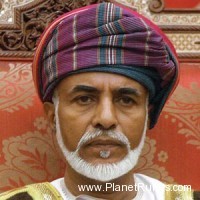Qaboos bin Said Al-Said, Sultan of Oman

On return to Oman, his domineering and reactionary father kept him a virtual prisoner in the southern city of Salalah for the next six years, while a major insurgency by Nasserist guerrillas raged in the surrounding Dhofar region. Sultan Said bin Taimur kept Muscat and Oman an isolated and economically backward society, in which slavery was still common and oil revenues were spent exclusively on defence. To defeat the uprising and modernize Oman required a change in government. To that end Qaboos deposed his father in a coup of July 1970 with British assistance and to general public acclaim. Oman’s armed forces were supplemented by Iran and Britain, military assistance was received from Jordan, Saudi Arabia, and the Emirates, and an astute policy which encouraged defections from the rebel forces was pursued. The insurgency was defeated in 1975 and the rebels pardoned.
Since 1970, increased oil revenues have been used to modernize Oman rapidly, but in a different way from that of other Gulf oil states. Limited oil reserves are conserved for as long as possible; after defence expenditure, oil revenues are used primarily to educate and employ a youthful population; modernization is pursued to ensure no adverse affects on Islam, on Oman’s Islamic traditions and culture, on the natural environment and on external and internal security. In 1991, Sultan Qaboos established a Majlis al-Shoura (National Assembly) which has become the most vigorous and effective of all such political bodies in the Arabian peninsula.

